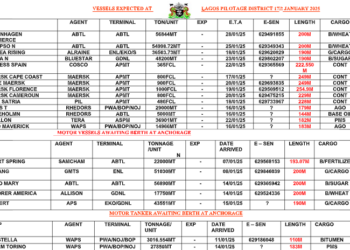Fresh details about the recently released level of non-compliance with the International Ships and Ports Facility Security (ISPS) Code in Nigeria emerged last week. The list of non-compliance facilities was obtained exclusively by Shipping Position Daily, and it shows that several oil jetties and facilities were also not safe.
Fresh details about the recently released level of non-compliance with the International Ships and Ports Facility Security (ISPS) Code in Nigeria emerged last week. The list of non-compliance facilities was obtained exclusively by Shipping Position Daily, and it shows that several oil jetties and facilities were also not safe.
The United States Coast Guard had recently confirmed that 13 more port facilities in Nigeria are now fully compliant with the International Ships and Ports Facility Security (ISPS) Code bringing the total number of compliant port facilities in the country to 22, up from nine since its last visit.
But Shipping Position Daily can confirm authoritatively that, while attention of stakeholders were focused on conventional port facilities, the United States Coast Guard actually added that that not less than 58 jetties, including petroleum jetties operating in Nigeria are not compliant with the ISPS Code.
According to a recent diplomatic note signed on behalf of the Department of Homeland Security by the Deputy Commandant for Operations of the United States Coast Guard, Vice Admiral Peter V. Neffenger, the petroleum loading and off-loading facilities fell below acceptable standard.
The unsecured jetties scattered across the country include: 58 jetties in Lagos which are: NigerDock jetty, Intercontinental Fishing Jetty, Allison Fisheries Jetty, Ocean Fisheries, Dantata Jetty, Standard Flour Jetty, all in Tin Can; Lister Flour Jetty, Osadjere Fishing Jetty, Eurafic oil Jetty, Seagold Fishing Jetty, Ibru Jetty, Port & Marine Service Jetty, Nido Gas Jetty, Atlas Cove Jetty, Nispan Jetty (Folawiyo Energy), Petroleum Wharf Apapa (PWA) jetty, New Oil Jetty (NOJ), Fishery Wharf(Waziri Jetty) and Bulk Oil Plant (BOP) jetty, all in Apapa.
In Ibafon, we have Julius Berger jetty, Single Bouy Mooring (SBM) jetty, Emsee jetty, and Contrans jetty. There are also Adsejere Jetty, Ijora Coal Wharf Jetty, Bakare Adewale Jetty and Tilla Fisheries Jetty. In Ajah, there is another Julius Berger jetty there. Along Ojo creeks, there is Dolphin Fisheries Jetty and Dee Jones Jetty.
Along the Novo creek, there is Obat Jetty and Commodore Pool jetty while Paradise Jetty is along the Five Cowrie Creek. Moving outside Lagos coast, Nigeria has 36 jetties in Port Harcourt. They are Willbros Jetty in Choba, Tidex Jetty in Ogbogoro, Ajip Jetty in lwofe, Nissco Jetty, Grinkar Jetty, Adamac Jetty, Kent Resources Jetty, Haastrup/Eagle Bulk Cement Jetty, Nepturn Jetty and Saipem Jetty all in Rumuolumeni.
There are jetties in Onne namely: Adamac Jetty, Wad Jetty, Starx Jetty, Wact Jetty, Dangote Jetty, and Atlas Cement Jetty. In Bonny, we have Mof Jetty, Tskj Jetty, Shell Slot jetty and Brt jetty.
In Warri, Delta State, there are 25 jetties namely: Daewoo Jetty, Chevron/Taxaco Jetty, DBN Jetty, Elf Jetty, Shell PDC Jetty, Globes Star Jetty, NWDM Jetty, Tidex Jetty, IWD Jetty, Shoreline jetty, Hercules OFFSHORE Hall Jetty, Hyundai Jetty, Seatruck Jetty, Futeb Jetty, Olowo Jetty, Ocan Jetty, Dufan Jetty, Four STAR Marine Jetty, B J Services Jetty, NBTC Jetty, DSC Jetty, Acro jetty, and NAOC Jetty. In Calabar, there are five jetties namely MC Iver Jetty, Calcemo Jetty, Addax Jetty, NNPC Jetty and QIT Jetty in Eket.
The Diplomatic Note however gave the names of the 22 compliant port facilities as: Apapa Bulk Terminal with IMO port number NGAPP-0009. Others are AP Moller Terminal NGAPP-0001, Greenview Terminal NGAPP-0004, Bonny Rivers Terminal NGBON-0001, NLNG Bonny Terminal NGBON-0002, SPDC Bonny Offshore Terminal NG663-001, CBQ FSO YOHO (Exxon Mobile) NG638–0001, CBQ Logistics Base NGCBQ–0001, CBQ McIver Wharf NGCBQ–0004, CBQ Port Terminal A NGCBQ–0002, CBQ QIT BOP NGOBO–0001, ESC Escra BOP NGESC–0001, ESC LPG–FSO NGESC–0003, Forcados Offshore Terminal NGFOR–0001, ONN FLT NGONN–0005, ONN FOT NGONN–0006.
At the Tin Can Island port, the US Coast Guard cleared: Dantata MRS Terminal with IMO Port No NGTIN–0003, Five Star Logistics NGTIN–0013, Port & Cargo Handling Terminal C NGTIN–0011, PTML Terminal E NGTIN–0010, Snake Island Integrated Free Zone NGTIN–0001, and the Tincan Island Container Terminal B with IMO Port No.NGTIN–0009.
According to the Diplomatic Note, “apart from the aforementioned ports and terminals, the US Coast Guard does not find that ports in the Federal Republic of Nigeria maintain effective anti-terrorism measure with certain exceptions and that Nigeria’s ;legal regime, designated authority oversight, access control and cargo control are all deficient.”
The US Coast Guard had stated that, ”Accordingly, beginning from June 26th, 2014, the Condition of Entry will apply to a vessel that visited a non-excepted Nigerian port in its last five port calls.”
But, in an earlier engagement between the officials of the United States government and the Nigerian Maritime Administration and Safety Agency (NIMASA) in Lagos, the US government had acknowledged the efforts of the agency in raising the security levels of ships and port facilities in Nigeria and assured of its commitment to continue to partner with Nigeria to improve security measures.
In addition to this, the United States Embassy, had in the same diplomatic note, acknowledged that although Nigeria might be facing significant difficulty in instituting the needed security measures, the progress Nigeria had made, so far, was well noted and the clear delineation of NIMASA as the Designated Authority was a positive step.
Shipping Position Daily also recalls that the United States however placed Nigeria on the Port Security Advisory, even as it acknowledged that 22 port facilities in Nigeria are fully ISPS Code compliant. Accordingly, Conditions of Entry (COE) have been imposed on vessels originating or calling from non-compliant ports in Nigeria which will be subjected to further security checks before being allowed into the United States of America.
The Diplomatic Note however explained that, “the COE is not trade sanction and does not ban Nigerian ships from entering US Ports”.
















Discussion about this post